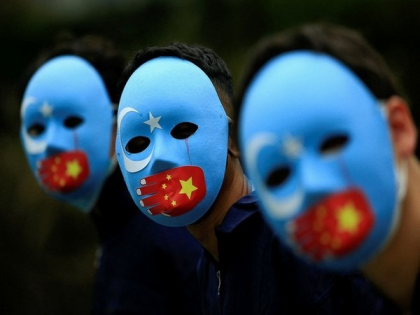Dozens of New Xinjiang-Europe cargo routes raise forced labour concerns
By ANI | Updated: August 13, 2025 14:50 IST2025-08-13T14:43:46+5:302025-08-13T14:50:01+5:30
London [UK], August 13 : Over the past year, China's Xinjiang province has seen the launch of more than ...

Dozens of New Xinjiang-Europe cargo routes raise forced labour concerns
London [UK], August 13 : Over the past year, China's Xinjiang province has seen the launch of more than 40 new freight routes to Europe, moving thousands of tons of goods, according to Politico.
The expansion comes despite ongoing accusations that Beijing is committing human rights abuses and using forced labour against the Uyghur population in the region.
Data compiled by the Washington-based Uyghur Human Rights Project (UHRP) shows that more than nine cargo operators now fly from Xinjiang to destinations including the UK, Germany, Hungary, Greece, Switzerland, Belgium, Ireland, Spain, and other European countries. The findings are based on an analysis of air freight movements between June 2024 and May 2025.
The UHRP report warns that the "rapid expansion" of air cargo links from Xinjiang to Europe poses "a growing threat to the integrity of EU and UK supply chains," noting that shipments often include e-commerce items, textiles, footwear, electronics, auto parts, and agricultural products, industries with high exposure to forced labour risks.
Some carriers insist there is no evidence their freight contains such goods, while others claim they are not responsible for monitoring suppliers.
David Alton, chair of the UK Parliament's Joint Committee on Human Rights, said he was "deeply concerned" by the findings, pointing out that the growth in flights seems to undermine the EU's newly adopted forced labour screening mechanism.
In July, his committee warned that Britain risks becoming "a dumping ground" for products linked to modern slavery and called for targeted import bans to address weaknesses in the UK's 2015 Modern Slavery Act. This law obliges companies to issue annual statements outlining how they are working to prevent forced labour, but critics say enforcement is weak.
Citing Volkswagen's decision to withdraw from the region due to the inability to audit its supply chain, Alton stressed that the Chinese government has repeatedly denied access to United Nations Special Rapporteurs.
Numerous investigations by governments, the UN, human rights groups, researchers, and survivor testimonies have documented evidence of widespread, state-backed coercion of Uyghur labour in Xinjiang.
In 2021, British MPs voted to recognise China's actions as "genocide," citing the "widespread use of forced labour," while the U.S. banned imports linked to Uyghur forced labour that same year, later expanding the ban in early 2025, according to Politico.
Sian Lea of Anti-Slavery International stated that "all products" from the Uyghur Region should be presumed to involve forced labour, describing the practice as "widespread and systematic."
She also noted that Xinjiang's Urumqi airport has been promoted by Chinese authorities as a key hub in the "Air Silk Road" initiative, linking the region to global trade as part of President Xi Jinping's Belt and Road strategy.
While the EU's Forced Labour Regulation, introduced in late 2024, aims to block goods produced through exploitation, and the UK's Modern Slavery Act seeks similar goals, both face serious enforcement challenges due to limited border checks and the difficulty of tracing complex global supply chains, Politico reported.
Disclaimer: This post has been auto-published from an agency feed without any modifications to the text and has not been reviewed by an editor
Open in app